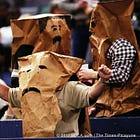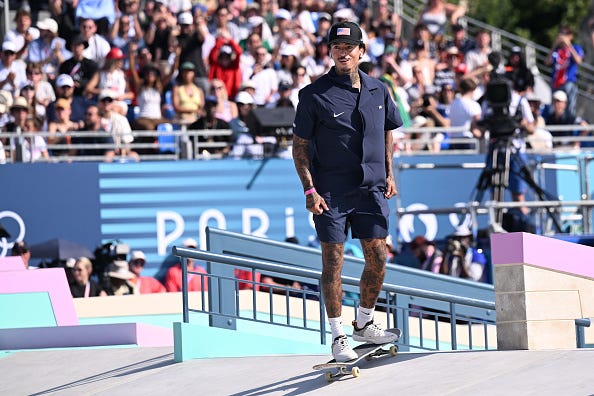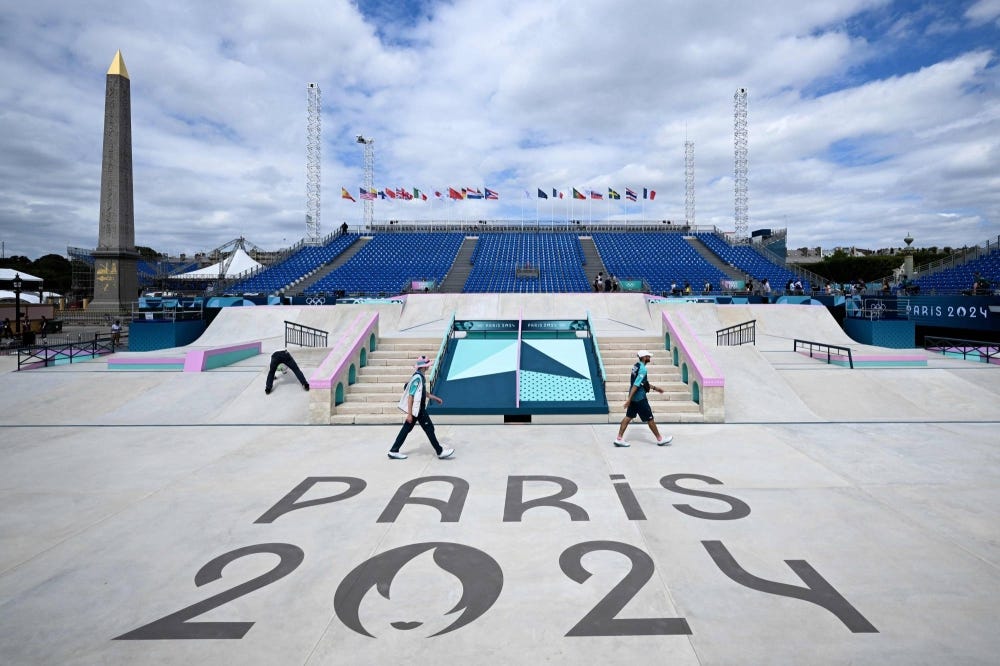The Five: Thrashers (1950)
Skateboarding and the Olympic ideal.
This is Throwbacks, a newsletter by me, Michael Weinreb, about sports, history, culture and politics, and everything in-between.
If you like what you read, please click the button below, join the mailing list for FREE and share, on social media or through e-mail or however you feel comfortable sharing.
And if you’ve been reading for a while, please consider a paid subscription to keep this thing going—you’ll also get full access to the archive of over 175 articles, like this one:
I.
Sometime in the 1950s, a bunch of bored surfers, seeking something to do when the waves flattened out, invented a new sport that involved gluing a wooden board to four roller-skate wheels. Over time, that sport grew and evolved into parks and streets and stairwells, where middle-aged people became increasingly annoyed by its very presence. It became associated with slacker culture and punk rock and underground videos; it was prohibited in a number of cities until those same cities finally gave in to its enduring popularity and began building elaborate parks to host its practitioners.
This sport continued to grow even as it shunned the mainstream, until it got so big that it could not avoid the attention anymore. It was so huge that the entire world took notice. And this is how I found myself tuning into an obscure channel on my television set this week to watch a bunch of skateboarders make their way down a “course” composed of series of outdoor staircases and railings contrived specifically for the Olympic games.
This is the second Olympics to include skateboarding, and it is still a very strange thing, to watch a sport that exploded despite such cultural approbation be contested in such a contrived setting. There is something so painfully awkward about it all, as if Fugazi had licensed its music for AT&T commercial. And for a lot of people, it feels like the ultimate point of no return.
II.
This week, a Japanese skater named Yuto Horigome won the gold medal in the men’s street competition. An American named Jagger Eaton—whose father, perhaps not surprisingly, owns a skateboard school—won the silver, and a 30-year old tatooed dude named Nyjah Huston won the bronze. Huston is a vegan home-schooled 40-year-old son of Rastafarians from northern California, and apparently a lot of people in the skateboarding world view him as the most repulsive thing you can possibly be in their sport: A total sellout. Part of this is because Huston has an allegedly ugly history with women; but part it is also because, as one Reddit commenter writes, “comes from the fact he presents himself as more of an ‘athlete’ than a traditional ‘skater.’…his vibe just doesn't go with what a lot of people enjoy seeing from skaters.”
III.
I have stood on a skateboard perhaps four times in my life, and at least three of them ended in disaster. (In the other, I was completely stationary, and still managed to sprain my MCL.) And yet there is something truly spectacular about randomly tuning into an Olympic sport that you were not entirely sure existed and hearing the commentators treat it with absolute reverence. I heard a color commentator refer to a move called a Nolly Heel Back Tail; I heard her marvel at the execution of a Burial Heel Backstop Five-Oh, which I have to imagine was concocted as a method of fleeing from the police in 1980s Los Angeles.
After about ten minutes of this, I found myself a critic of the execution of a sport I knew literally nothing about. This is both part of the joy of the Olympics and a metaphor for our current moment, where everyone believes they’re an expert on everything.
And I suppose this is why skateboarders are so fearful of what might happen now that they are officially an Olympic sport: Because it means that the rebellion is over. Because it means that a sport once defined by originality and freedom is now just another zero-sum competition that belongs to the world at large. Everyone has an opinion about it now, and a lot of those opinions are going to be willfully ignorant.
IV.
“Inclusion is not the point of the Olympics,” Suzy Weiss wrote in the Free Press, a publication that often tends to overestimate its own counterintuitive intelligence. “Quite the opposite. Excellence is the point. There are only so many spots, and medals, and the winners get gold by being the best—and that’s okay.”
These words came in the midst of a nonsensical column discussing the conservative raging about the Opening Ceremonies that I am not even going to bother to get into here. But Weiss’s larger point (I think) is that the Olympics should somehow not give in to P.C. culture by emphasizing inclusion (which, of course, makes no sense given that the most iconic moment in the Olympics was about a black man foiling the plans of the most exclusionary government in the modern history). And sentiments like this do make you wonder what happens to a sport like skateboarding when it’s wedged into that zero-sum structure.
“To me, skateboarding is all about individuality and originality,” skateboarder John Cardiel told Thrasher magazine back in 2018. “It has nothing to do with highest, furthest, longest. Skating being an Olympic sport contradicts everything that I believe skateboarding to be. Skating has always been an intuitive and free path.”
V.
A few months ago, I spoke to a woman named Tricia Byrnes, who was present at the moment when snowboarding ballooned from a cult pastime on a Vermont mountain and into a nationwide fad. She had seen the way young snowboarders focused only on their image; she had seen the way they now chased championships and gold medals, and she couldn’t help but wonder what had been lost.
“It’s not so much about winning,” Byrnes told me, when I asked her how snowboarding had changed her life. “It’s just about finding that next level, or putting yourself out there, or failing and growing and failing again. It’s all a metaphor for life or something, even if I don’t know what.”
That may seem contradictory to the Olympic ideal espoused by hyper-competitive zealots. It may be why there’s a divide in so many extreme sports that have been co-opted by the Olympic movement—between those who got into it for the competition and those who got into it because it wasn’t a competition. But sometimes, the excellence isn’t the only point.
And this, to me, is the allure of Olympic “extreme” sports like skateboarding—the athletes care, but they don’t really care, because they know winning and losing only mean so much in the end. In 2021, one female skateboarder, posing for a photo with her Olympic teammates, flipped the bird to the camera, in what writer and skateboarder Nic Dobija-Nootens called “the individualistic spirit enduring.” By simultaneously competing and raising a middle finger to the idea of competition itself, they’re making us question what matters, and what should matter. Even if they have power now, they will still fight the power, because to them, the metaphor will always mean more than the medals.
This newsletter is a perpetual work in progress. Thoughts? Ideas for future editions? Reply directly to this newsletter, contact me via twitter or at michaeliweinreb at gmail, or leave a comment below. If you enjoyed this newsletter, please join the list and share it with others or consider a paid subscription.





Great writing as always, Michael. But I think people like John Cardiel complaining about skateboarding being in the Olympics because it’s not qbout “highest, furthest , longest” are full of $hit.
Skateboarding has always been about who could get the most air in a half-pipe, and land the most tricks. There have been major competitions in skateboarding since at least the early to mid 1970s, and then in the 80s as the sport grew even larger, many competitions were created and managed by the father of perhaps the most well-known skateboarder in history, Tony Hawk.
Point is that the Olympics is simply the next logical place for an activity that has grown to be an accepted athletic competitive endeavor, and which has made many, many people very, very famous for skating better than others. And for what it’s worth, it’s a sport which has made many others very very wealthy.
Jagger Eaton's skate attire looked like he would be on the tennis court
white cap, white shirt, white shorts, nike swoosh